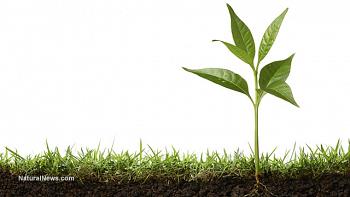Protect Your Health at the Roots, literally, With These Five Healthy Medicinal Roots
(NaturalNews) The roots of a plant do more than just
anchor it in the soil. Roots are like foragers, blazing trails into the
unknown soil. As they reach out in search of food and water, roots form
tiny hairs that help draw in the moisture and minerals that the whole
plant needs. The water and mineral salts are then carried into the
rhizome, the trunk, the branches, the flowers and the leaves, providing
life and vitality to every part.
Some roots serve a higher
purpose that goes beyond simply providing food and water for the plant.
Some roots and rhizomes are designed to be man's most basic medicines.
Some roots intelligently speak the internal language of the human body,
cleansing it, correcting imbalances and maladies that we may face. In a
way, roots are like living, breathing helpmates, connecting mankind back to Earth for the prevention of disease.
If
plant life depends on roots to thrive, then man must heed this wisdom
and seek out the roots that give him sustenance, balance and fortitude.
Sadly, most restaurant salads don't include any of the wonderful healing
roots available to man. The USDA food pyramid and most conventional
medical eating guidelines, commercial diets and wellness plans never
even include roots as a staple healing food.
Ginger
The first root to study, eat and enjoy is ginger rhizome. Not only is this root spicy and flavorful, but it's a quick cure for nausea, stomachache, non-essential vomiting and menstrual cramps. Quickly, ginger root improves the cholesterol profile of the blood, while improving digestion (and nutrient utilization). It's also a powerful anti-inflammatory.
Parsnips
Parsnips, which look a lot like carrots, are a medicinal root crop rich in magnesium, calcium, potassium and phosphorous. Parsnips once grew wild 1,500 meters above sea level in Italy, and are now cultivated and used in a variety of culinary dishes. Parsnips are traditionally used in stews, but they can be baked, steamed, or added to stir-fry recipes. Interestingly, they are a good source of vitamin C.Turmeric
There's plenty of excitement about turmeric today, and for good reason. Turmeric rhizome contains a powerful plant medicine named curcumin, which serves several healing purposes in the body. One purpose is the obstruction of colon cancer. In this study, curcumin put colon cancer cells through a process of phosphorylation, altering the function and activity of certain protein enzymes. In the studies, curcumin caused wild-type p53 HCT-116 cancer cells to self-destruct, and destroyed mutant p53 HT-29 cancer cells.While the powers of curcumin are well documented, the most difficult challenge is utilizing curcumin's properties, since it has poor bio-availability. To increase turmeric's overall healing effect, it's best to consume the root with black pepper, cayenne and a healthy oil like coconut oil. A little turmeric every day will greatly enhance a person's quality of life, reducing inflammation, improving digestion and protecting the blood and brain from toxins.
Carrots
Wild carrot grows in ditches, roadsides and fields throughout most of North America. The bodacious scent of the hard, woody root resembles today's popular orange, domesticated carrots. While wild carrot can be harvested and boiled into soups in a survival situation, it's the popular orange variety that most people enjoy. A cup of chopped orange carrots provides the body with an excellent supply of thiamin, niacin, Vitamin B6, folate, manganese, dietary fiber, potassium and vitamins A, C and K.Burdock
Burdock is an extraordinary blood cleansing herb that grows wild in fields and vacant lots. Sadly, many towns have municipal laws that declare herbs like burdock a nuisance. Municipal codes designate herbs as "weeds" that must be destroyed with toxic herbicides. In spite of these laws, greater burdock is a well respected medicine that has antiseptic and cleansing properties. For this reason, burdock root is beneficial for the skin, and helps with kidney stones, gout, urinary tract infections, cysts and diabetes. In Japan, burdock root is used to prepare miso soups. It's best to drink plenty of clean water with cleansing herbs to enhance the detoxifying process and prevent dehydration. As a powdered herbal supplement, burdock is powerful in small quantities (1tsp), and when combined with turmeric, strongly assists the body's natural detoxification processes.Sources include:
GreenMe.it
Science.NaturalNews.com
Read More..
Comments
There are 0 comments on this post













